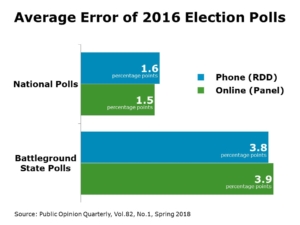More Evidence that Online Polls Work (Really Well)
You might think that writing a feature article about liars, cheaters, and trolls in online surveys means we have a pretty damning view of online polls as a method of research. Not so. We are all in when it comes to online polling, and in fact it comprises the majority of the survey research we do.
Some of our industry colleagues, however, do have a dim view of online polls, and indeed the American Association for Public Opinion Research (AAPOR) only recently began to acknowledge that careful, well-executed online surveys can work as well or better than phone surveys. A study just published by AAPOR itself provides additional evidence that online polls work.
AAPOR appointed a distinguished committee of academic and industry experts to analyze and evaluate the 2016 presidential election polling. They examined data from multiple polling organizations who used a variety of methods. They looked at how far off each poll and each method was in predicting the actual vote tally. Then they computed overall averages. Here are the results:
 The overall accuracy of online vs. phone surveys was nearly identical. Online polling has a slight edge at the national level. Phone surveys had a slight edge at the state level, which is not surprising: We know that online polls are more difficult (sometimes impossible) in smaller geographies.
The overall accuracy of online vs. phone surveys was nearly identical. Online polling has a slight edge at the national level. Phone surveys had a slight edge at the state level, which is not surprising: We know that online polls are more difficult (sometimes impossible) in smaller geographies.
Yes, there are big challenges to online polling. It involves more than writing a few survey questions and then inviting the world to weigh in. There are many sources of bias and error, and it takes careful design, execution, cleaning, and analysis to navigate those errors and correct for them. But smart people (and smart firms – that’s why you hire Versta Research!) can do it, and do it really well.







